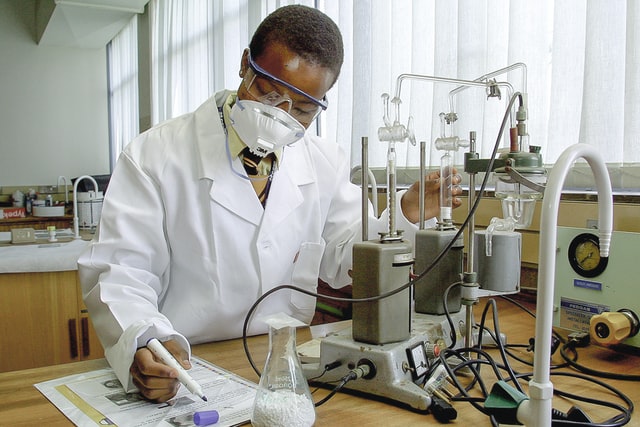New Cancer Therapy Kills Ovarian, Bowel Tumors, Doctors Say, What Does It Mean For Us?
Researchers will begin clinical trials in the next few months.


Photo by Hush Naidoo Jade Photography on Unsplash
A new cancer therapy could kill advanced ovarian and bowel tumors, according to a recent lab study.
The Food and Drug Administration approved proinflammatory cytokines to kill cancerous cells in the skin and kidneys. However, researchers have discovered protective human cells (ARPE-19 “RPE”) that naturally produce cytokines. Cytokines are “molecular messengers” that boost the immune system when ” in response to stimuli from antigen-presenting cells.” And since the tiny molecules showed positive results with cancer cells, a study was conducted using interleukin-2 (IL2)-producing cytokines to destroy ovarian and colorectal tumors.
Researchers will begin clinical trials in the next few months due to “very exciting” results when the therapy was used on mice, Science advances reported.
“We just administer once, but they keep making the dose every day, where it’s needed until the cancer is eliminated,” said co-author Dr. Omid Veiseh, of Rice University in Houston, Texas, who witnessed a family friend die from the disease.
“Once we determined the correct dose—how many factories we needed—we were able to eradicate tumors in 100% of animals with ovarian cancer and in seven of eight animals with colorectal cancer.”
Clinicians have determined that interleukin-2 cytokines can be implanted with minimally invasive surgery and plans to test humans in the fall. The goal is to monitor the positive outcomes of the cytokines and have them available in hospitals moving forward.
While the drugs Aldesleukin or Proleukin have been approved by the FDA since 1992, it was confirmed that they caused severe side effects while treating melanoma and renal cancers. However, researchers have ensured that the human cells killing ovarian and colorectal cancers were deemed safe for humans.
The drug-producing beads were inserted next to the tumors in the lab rodents’ abdominal cavity, supporting areas in the intestines, ovaries, and other organs. According to the results, the tumors were dissolved while monitoring proper dosage.
“A major challenge in the field of immunotherapy is to increase tumor inflammation and anti-tumor immunity while avoiding systemic side effects of cytokines and other pro-inflammatory drugs,” said co-author Professor Amir Jazaeri, of Texas University.
“In this study, we demonstrated that the ‘drug factories’ allow regulatable local administration of interleukin-2 and the eradication of tumor in several mouse models, which is very exciting,” he explained.
Since interleukin-2 is a protein used to fight off disease in the immune system, it can only be administered to target cancerous tumors at the site. Amanda Nash, lead author and graduate student in Dr. Veiseh’s lab, said the cytokines produce the most potent immune system to date.
“If you gave the same concentration of the protein through an IV pump, it would be extremely toxic,” she said.
Nash explained that the drug-like beads could treat other forms of cancers, including the pancreas, liver, and lungs. The process would involve using a different cytokine while protecting the outer shell so it wouldn’t threaten the immune system.
“We found foreign body reactions safely and robustly turned off the flow of cytokine from the capsules within 30 days,” Dr. Veiseh explained.
The research also concluded that a second treatment dose could be administered if needed.
While colorectal cancer is one of the most common cancers to date, ovarian cancer is deadly since diagnosis mainly occurs at later stages when treatment is less effective.
According to the National Cancer Institute, ovarian cancer is the fifth leading cause of cancer death among women in the United States. In addition, statistics from 1975 to 2016 had a five-year survival rate from 33 percent to 48 percent among non-Hispanic White women but decreased from 44 percent to 41 percent among African-American women.
“Lack of access to health care is likely to be a key factor in these low [treatment] rates,” said Dr. Akinyemiju, noting that access to care is determined by many factors. The study she conducted defined five dimensions to assess health care access: affordability, availability, accessibility, accommodation, and acceptability.
“Each of the five dimensions captures a distinct aspect of access, and barriers in one or more of these can significantly affect whether a patient receives quality care,” Dr. Akinyemiju said. “We can also examine differences between patients who reside in rural and urban areas, and between White, African-American, and Hispanic patients.
Though health care access is a crucial factor in the Black community, Black women are less likely to have their ovarian tumors examined by physicians, leading to disparities in treatment and limited cancer-prevention opportunities for family members, nature reported.
Colorectal cancer is another deadly disease that has plagued the Black community for years. So many were shocked after beloved actor Chadwick Boseman died from colorectal cancer at age 43. Initially, those 50 years old or older were likely to be diagnosed with colorectal cancer, but increased diagnoses among younger Black men have increased.
The American Cancer Society found that in 2020, “12 percent of colorectal cancers – about 18,000 cases – will be diagnosed in people under the age of 50 in the US.” As a result, Black men have a greater chance of colorectal diagnosis than their white, Hispanic, and Asian counterparts.
With the discovery of cytokines, those diagnosed with ovarian and colorectal cancer could receive treatment to destroy cancerous tumors in the body.
